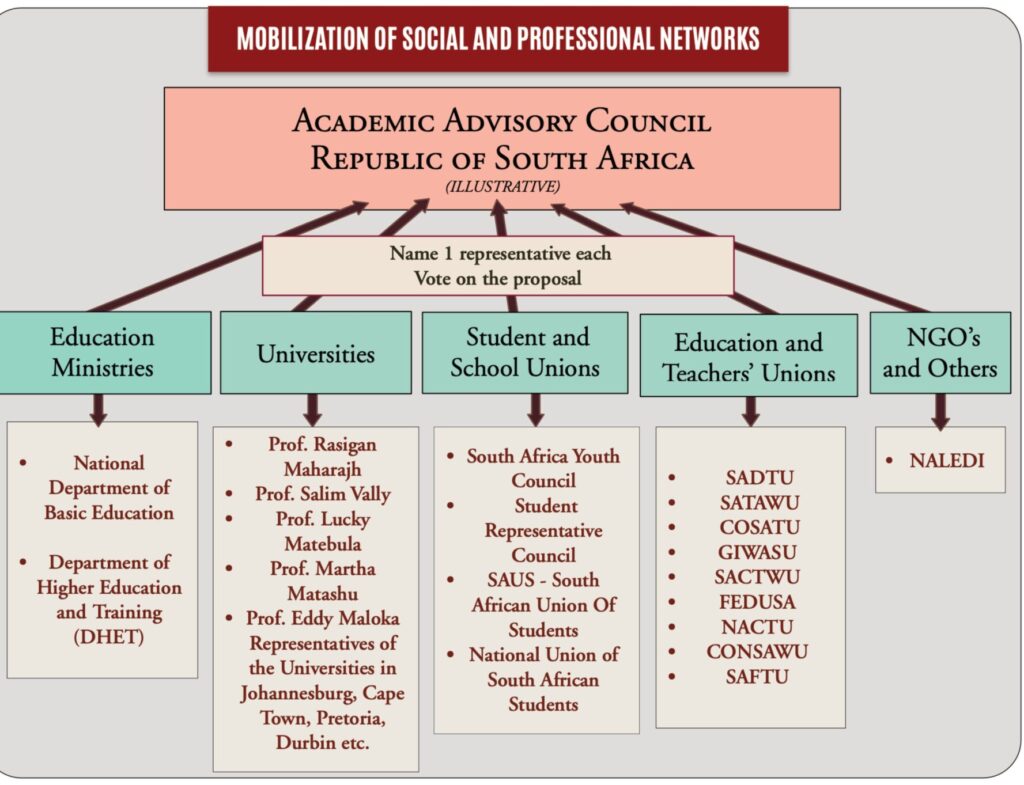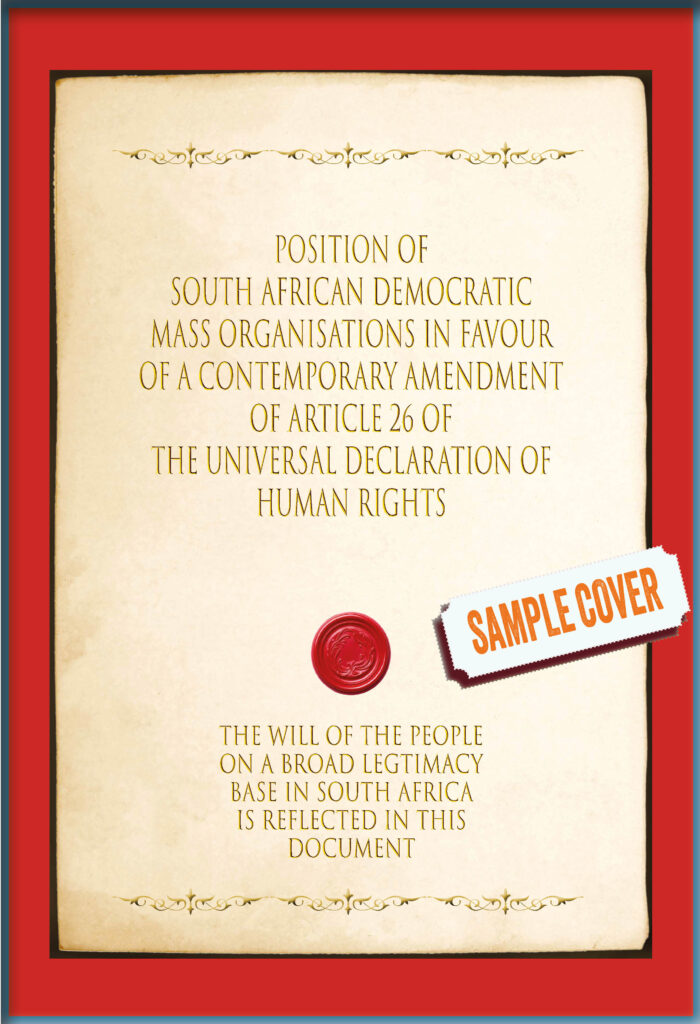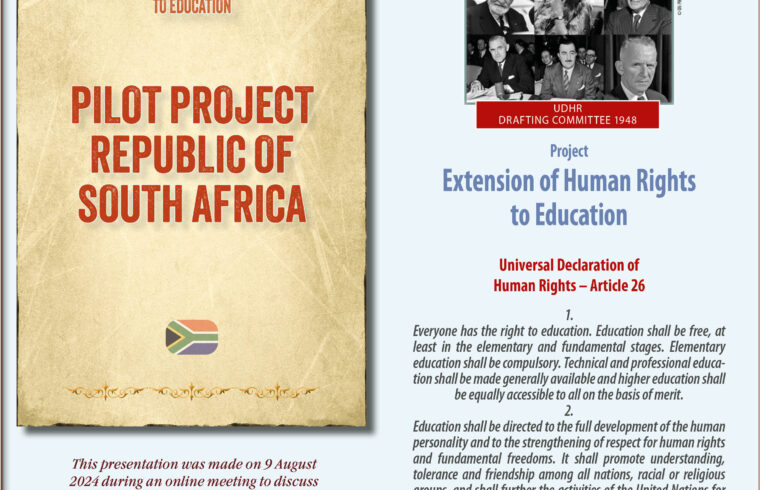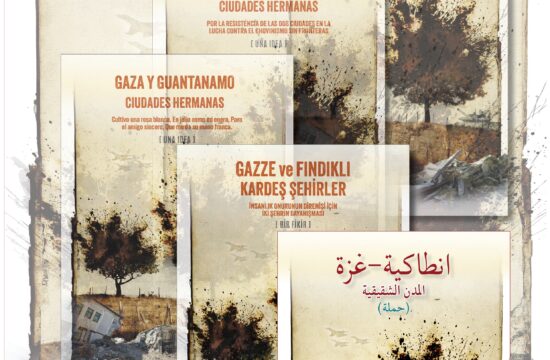PoliTeknik Int.
Dear Participants,
I warmly welcome you all and it is good to be here with you at this important meeting.
It is positive for all of us that the Republic of South Africa has been selected as the pilot project country for our engagement called Extension of Human Rights to Education (PROJECT ARTICLE 26). At the Academic Advisory Board (AAB) meeting in February this year, I presented the idea of the pilot project to the participants, and we were encouraged that the Secretary General of SADTU, Comrade Mugwena Maluleke, was in favour of the idea. We would like to remind you that Comrade Maluleke was recently elected President of Education International. Congratulations once again. We shared this pilot project idea with our main platform as follows:
„The objective of Project Article 26 is to prepare a joint declaration to amend Article 26 of the UDHR. To this end, it is planned that in each country, if possible, our partners will set up an advisory board. These boards will be composed of one representative each from the ministries, trade unions, student organisations, universities, NGOs, etc. in the country in question, who will be elected to the advisory board. If we can start a pilot project in South Africa, could this be important for our partners in other countries? Our relations in South Africa seem very mature and seem to offer potential for such a case study. In this questionnaire we would like to get your opinion and learn about your expectations about the pilot project country experience“.
As our partners, we asked for your opinion on this and your answers to the selective questions we posed were in favour of the implementation of the pilot.
Dear colleagues and comrades,
The pilot project will confront us with a dynamic process. As we build a very interesting moment together, we will also be witnesses to this moment. If we succeed, we will have witnessed a rare event in history. Global actors and masses of people with aligned interests will come together to formulate the right to education as a human right in perhaps its most comprehensive sense, and, more importantly, to defend that right themselves. It is not surprising that listening to the first pulses of such a moment in South Africa should have an extraordinarily positive connotation for those who know the history of resistance in that country and are eagerly awaiting liberation.
So how will the pilot project work?
In the first instance, we will take steps to create what we have labelled above as the National Academic Advisory Council (RSA-NAAC) for South Africa. Our sample image is as follows:
So, for example, the formation of an RSA-NAAC, which SADTU and comrades Prof. Rasigan Maharajh and Prof. Martha Matashu will coordinate with our help, will be announced to the nationally selected constituents and they will be invited to participate by sending a representative to the NAAC. Let us assume that this process will last until the end of November 2024. By that date, a sensitisation among national stakeholders will have been achieved and the groundwork for the RSA case study will have been prepared.
Then, together with the RSA-NAAC, we will start to draw the main lines of discussion. Our partners from 45 countries will follow this process very closely and will be responsible for the tasks to be assigned if necessary.
What could be the content of this discussion? Let’s list the topics that come to our minds to give an idea:
• The human rights – are they finally definable?
• What is the „human nature“?
• Is the market conformity of education not at the same time its inescapable limitation?
• Is the human being reduced to wage dependency not already disconnected from „human rights“?
• The Link between Unskilled Labour Requirement and Exclusion from Education
• Education transformations driven by international organizations
• Illegitimate interventions in education policy at national and international level
• Right to education in conflict zones
• Economic crisis and its effects on the Right to Education
• The erosion of the international law and its effect on the right to education
• Interdependence of national independence, Industrialization and Educational Progress
• Elite education or qualitative education without competition?
• Which interests are absolutely opposed to a „qualitative education for all“?
• Democratization of the UNO – Is a Reform Enough for a Substantial Change or do we need a voice, vote and veto right of the working class?
• The idea of relocation of the UN headquarters
• Democratization of the digital world
• a) Definition of education b) Quality of education c) Costs of and access to education d) Providers of education e) Duration of education f) Implementation of the declaration g) Other points (max. 10 pages)
The RSA-NAAC constituents will have the opportunity to put forward their proposals on the above and/or similar issues at different consultation meetings. Depending on the frequency of the consultation meetings, by the end of 2025 or January 2026, a catalogue of proposals for the progressive reformulation of Article 26 of the UDHR will be drafted by the RSA-NAAC.
The process can or should also be accompanied by the ACADEMIC ADVISOR BOARD (AAB), the main working group of our project Extension of Human Rights to Education.
MEMBERS (16)
• Prof. Dr Marlies W. Fröse – Germany
• Prof. Dr Eric Mührel – Germany
• Rama Kant Rai – National Coalition for Education – India
• Prof. Dr Benjamin Bunk – Germany
• Prof. Dr Xavier Diez – Spain
• Prof. Rasigan Maharajh – South Africa
• Prof. Dr Michael Klundt – Germany
• Prof. Dr Peter Rödler – Germany
• Prof Enrique Diez – Spain
• Prof. Martha Matashu – Sudáfrica
• Prof. Sanjoy Roy – India
Let’s go back to the image above and show as an example how a catalogue of proposals for the RSA can be based on a strong representation of universities and Congress of South African Trade Unions COSATU.

The University of the Witwatersrand is one of the leading universities in Johannesburg. Like any university, it has numerous faculties, departments and chairs in social sciences, law, education, psychology and many other disciplines related to our project. A search on the university’s website reveals, for example, the UNESCO Chair in Teacher Education and a list of several professors. A letter could therefore be written to the rector, deans and/or chairs informing them of the pilot project and inviting them to participate. In this way, experts from different fields within a university can be recruited to participate in the pilot study and this method can be replicated in other leading universities in the country: Cape Town, Pretoria, Stellenbosch, KwaZulu-Natal, Western Cape, North West, etc. Reaching out to the student unions in these universities would also be a great achievement, and there are many member unions of COSATU, the Congress of South African Trade Unions. The involvement of COSATU, which encompasses workers from different sectors, would provide an enormous and indispensable opportunity to give the catalogue of proposals a broad base of legitimacy. We can imagine how valuable, democratic and effective a catalogue of proposals reflecting the demands of workers in education, health, mining, energy, textiles, forestry, agriculture, transport, etc. would be.
The Academic Advisory Council (RSA-NAAC) that we will set up in South Africa could be centred in a central location, and could provide an umbrella for representatives of all the structures that it will cover, for example the Headquarters of SADTU.
In addition, different organisations could host academic and organisational discussions based on topics to be identified. For example, representatives could convene at the University of Johannesburg at the invitation of Prof. Salim Valley on the following topic:
The Interdependence of National Independence, Economic Development and Progress of the Education Systems.
For example, in a meeting organised by COSATU, the following topics could be discussed:
• Is the human being reduced to wage dependency not already disconnected
from „human rights“?
• The Link between Unskilled Labour Requirement and Exclusion from Education
The ideas that come to the fore and are agreed upon at the meetings will be formulated into articles for the declaration.

RECOMMENDATIONS
CATALOGUE PREPARATION
MEETINGS
• Starting with Keynote Speeches on specific topics
• Continuing with: Members of the Academic Council come together to discuss the specific topics from the own point of view. This is itemised and presented to a team that will formulate the catalogue of recommendations. It is conceivable that this team is a local team (RSA-NAAC) and that the task could be carried out with the AAB.
• The draft text will be submitted to all democratic mass organisations participating in the NAAC for a vote.
* It is important to note that this pilot project for the modification of Article 26 could take on the character of an Education Programme/ Policy formulated and advocated by democratic mass movements for the Republic of South Africa. This is an important aspect of the pilot project.
• RECOMMENDATIONS
CATALOGUE FINALISATION
It is always envisaged that international organisations will be invited to the consultation meetings, for example:
– United Nations, UNESCO
– Education International
– World Federation of Trade Unions
– WFTU
– International Trade Union Confederation
– IndustriAll Global Union
– Building and Wood Workers‘ International
– International Transport Workers’ Federation
– International Union of Domestic Workers
– La Via Campesina International Peasant Movement.
PWRIOSJHEICNTG W TIHLALT D TEEHPEE PNI LTOHTE BUENTWITEYE ANN ODU SRO PLIADRATRNIETRYS












